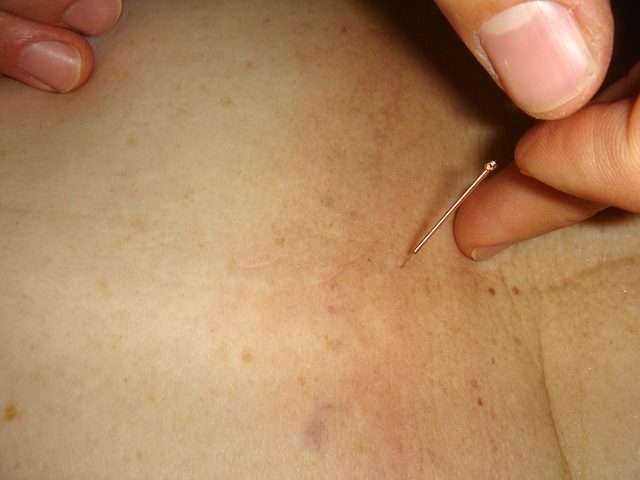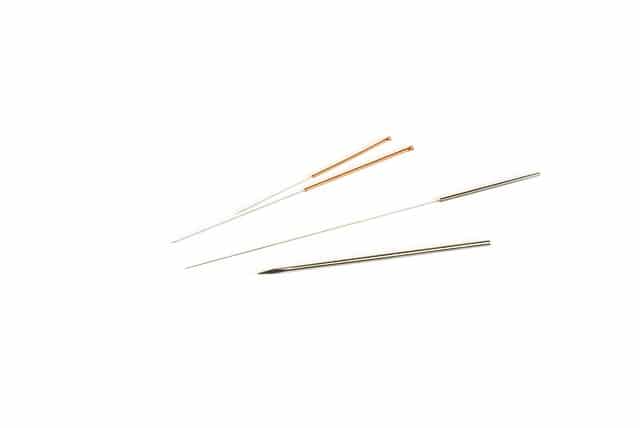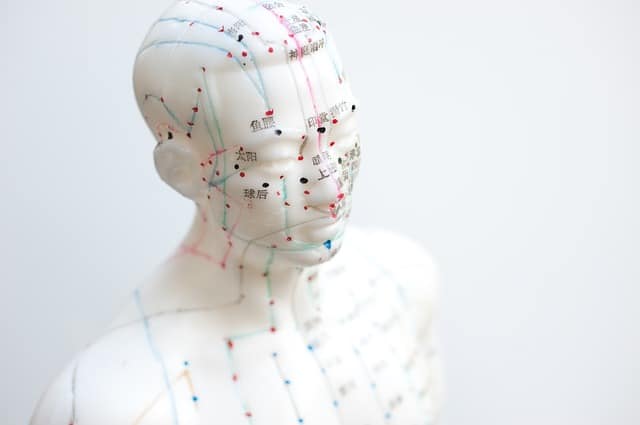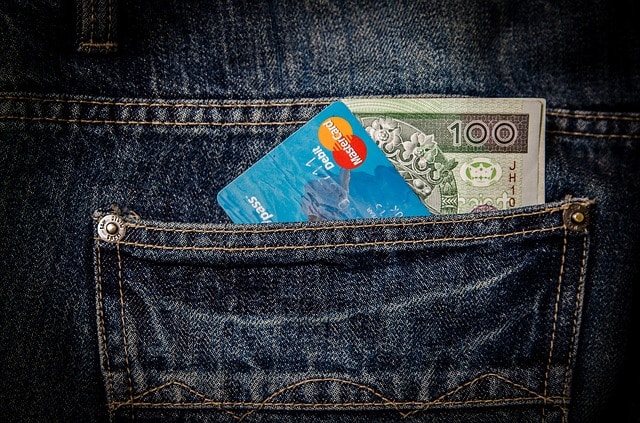
Let’s get right to the point about dogs, needles, and canine acupuncture. Some of us have heard about the use of acupuncture for humans. However, few are aware that it is an option for their dogs. In short, what is the point of canine acupuncture, anyway?
Is Canine Acupuncture safe for my dog, and does it work?
First, we will talk about what acupuncture does and does not do and how it works. Secondly, we will discuss how canine acupuncture may be used and modified for the best results.
If your dog has chronic pain or an inflammatory condition, your vet may refer you to a Chinese Medical practitioner. They received the training required to safely perform an ancient Chinese medical practice known as acupuncture. 
Acupuncture is most often recommended as a complement to more conventional medical therapies such as medication and surgery. Combined, the therapies can improve your dog’s quality of life.
Canine acupuncture should only be done by a veterinarian who has been trained in traditional Chinese veterinary medicine (TCVM). Occasionally, a Western Medicine trained vet will have taken an additional course to become certified in this procedure.

Although recommended for a wide variety of medical conditions, canine acupuncture is best for
- Allergies
- Arthritis
- Hip dysplasia
- Certain neurological disorders
It Is Not For Every Dog or Every Medical Condition
Although effective, canine acupuncture is not right for every dog or medical situation. It is best reserved for chronic conditions, especially those associated with inflammation.
However, it is not for infections or acute pain from trauma. But, if trauma-induced inflammation sets in as a chronic condition, it may be of benefit at that time.
Some dogs may not cooperate and will not remain still for the 20-minute sessions. If your dog is so sensitive that you cannot touch them, it will not be easy to insert the needles required for treatment. We will discuss alternatives for dogs that cannot tolerate needles later in this article.
How Does Canine Acupuncture Work (on a technical level)?
- Canine acupuncture relaxes muscles. The inserted needle causes muscle relaxation to take place in both the distant parts of the body. This provides local and generalized relief from pain.
- It also stimulates the release of the dog’s natural pain-relieving and anti-inflammatory substances.
- When pain is reduced, it increases blood flow to the tissue. The increase in blood flow increases oxygenation. This enhances the removal of metabolic wastes and toxins. These actions reduce pain further.
What Does Canine Acupuncture Not Do?
Unlike OTCs (over the counter) and prescription pain medications, canine acupuncture does not have potential adverse side effects for your dog’s internal organs. Canine acupuncture does not interact adversely with your dog’s supplements or its medications.
Canine acupuncture is not the treatment of choice for acute trauma and its associated pain or infection.
In More General Terms, How Does Canine Acupuncture Work?
From the Traditional Chinese Veterinary Medicine (TCVM) point of view, canine acupuncture encourages the dog’s body to heal itself. It does this by correcting the energy imbalances in its body.
By improving blood circulation, stimulating the nervous system, and by releasing anti-inflammatory and pain-relieving hormones, canine acupuncture helps the body to heal. This healing is the point of canine acupuncture.
Let’s Get to The Point of the Matter
When bundles of nerves and blood vessels combine, they form an acupuncture point. These acupuncture points are found all over the body. They are located on energy channels known as meridians.
The meridians allow energy to cycle throughout the body over every 24 hours. Acupuncture is the inserting of specialized needles into the body tissue where the blood vessels and bundles of nerves come together.

Terminology
- Acupressure is the administration of pressure to an acupuncture point. The results are similar to those achieved by inserting the acupuncture needles. If your dog will not tolerate the insertion of needles or the needle site would be hard to reach, this is a great option.
- Electrostimulation (Estim) is used to relax muscles in spasm by sending an electric current between the needles which have been inserted in the dog’s body. Estim can also assist the dog’s body to heal nerve damage done by damage to the spinal cord or nerve root. If your dog has ruptured an intervertebral disc, this may be one of the treatment options offered.
- Laser energy is sometimes applied to the acupuncture points to stimulate them. Further, it does not get hot enough to burn the dog’s skin or hair. Dogs that will not allow you to insert needles may be more easily treated with laser therapy.
- Aquapuncture is the injection of specific liquids to exert a change in energy by pushing tissue out of the way. There are several liquids they may choose to use, including a diluted form of Vitamin B 12, PSGAGs, and homeopathic entities.
- Moxibustion does include the use of needles. The TCVM applies a heated Chinese herbal compound to the acupuncture needle. The combination of heat and the herb being applied by the needle to the correct acupuncture site is very effective. Older dogs or those with sore muscles or joint stiffness are more likely to do well with Moxibustion than other dogs.
Canine Acupuncture Is Better For Some Medical Conditions Than Others
Dogs of all ages benefit from TCVM and Canine Acupuncture for many medical conditions. However, it is best to prevent problems from happening, when possible. The majority of the time, serious canine medical conditions are not diagnosed until the disease is already quite advanced.
Like with humans, inflammation is often a major contributing factor, and it is frequently accompanied by pain. Inflammation and pain are two of the conditions most commonly treated with canine acupuncture.
The primary point of canine acupuncture is to treat these, and other, medical conditions. Acupuncture helps the dog’s body to heal itself.
Some conditions treated with canine acupuncture are the following.
- Arthritis can be a problem at any age and can cause a great deal of pain. Inflammation causes joint pain. Treatment is to reduce that inflammation.
- Degenerative Joint Disease (DJD) is when arthritis has progressed to the point where the surfaces of the joint are now irregular. DJD leads to more pain and a diminished range of joint motion.
- Cancer is often associated with adverse side effects such as decreased appetite, nausea, and lethargy. Tissue swelling or organ enlargement can cause accompanying pain.
- Metabolic Diseases (such as diabetes, hypothyroidism, Addison’s disease, Cushing’s disease, hyperthyroidism, and liver or kidney failure) have treatable symptoms such as changes in appetite, nausea, and energy levels.
- Trauma caused by such things as fights with other animals, auto accidents, and surgery and can cause pain and inflammation. Trauma is not usually treated with canine acupuncture acutely. However, the resulting chronic problems are often treated successfully.
Who Performs Canine Acupuncture Treatment?
Not all vets know how to perform canine acupuncture. All vets should, however, be able to refer you to a vet who has received adequate training in this medical procedure.
At one time, only TCMV were capable of performing canine acupuncture. Now, however, some veterinarians trained in the United States schools have received instruction in the use of canine acupuncture.
Other vets may have taken additional courses in Alternative or Integrative Medicine Therapies and are capable of performing canine acupuncture.
Where Do You Go To Get Canine Acupuncture Treatment?
Once you have made the decision to obtain canine acupuncture therapy for your dog, you need to decide where to have it performed. While it can be done in a veterinary clinic or hospital, the absolute best location is in the dog’s home.
If the vet is willing to make a house-call to perform the procedure, there is less mental and physical stress on the dog. Not only is the dog more comfortable and likely to cooperate more fully, but there is also less risk of infection in his home than in a hospital or clinic.
Does One Treatment Cure The Problem?
No. Just like with humans, chronic problems are often hard to treat and take some time to resolve. The more serious medical problems (and the longer the dog has suffered with it), the longer it takes to treat.
Typically, they start with more frequent treatments and then taper to fewer treatments and longer intervals for maintenance. Most dogs do well with one to three sessions per week for the first few weeks. The goal is to achieve the most extended period where a dog’s condition has improved or resolved.
Do not forget that the beneficial effects of canine acupuncture treatment are cumulative. That being the case, consistent treatment is of more benefit to your dog than is intermittent treatment.
In Conclusion
If the plan to prevent a problem fails, early intervention is better than delayed care. Consistent canine acupuncture therapy is better than intermittent treatment.

Canine Acupuncture is Not Terribly Expensive But, What If Your Dog Needs Very Costly Therapy?
Do not despair if you have trouble paying for your dog’s vet bills. Financial assistance might be available for expensive medical therapy. You just need to know where to look. Check out this article:
https://happymutt.org/can-you-afford-to-own-a-dog/

Thanks to:
https://www.petmd.com/dog/wellness/evr_multi_veterinary-acupuncture-for-dogs-cats







